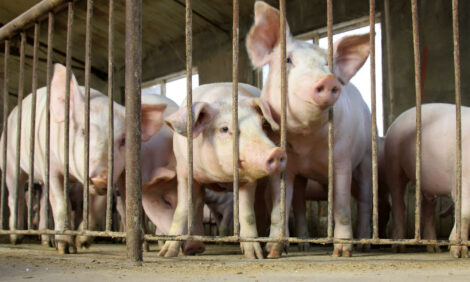



IPVS: Diagnostics Help in Monitoring, Controlling Swine Respiratory Diseases
IRELAND – From 7-10 June, the 24th International Pig Veterinary Society (IPVS) Congress gathered swine veterinarians from all over the globe. Thermo Fisher Scientific, world leader in serving science to deliver diagnostic tools and services, delivered a symposium on how diagnostics can help better monitor and control respiratory swine diseases, writes Nuria Martínez Herráez, editor of El Sitio Porcino, the Spanish sister of ThePigSite.On Tuesday 8 June, Thermo Fisher offered an interesting symposium on diagnostics and their role on monitoring and controlling important swine respiratory diseases, such as PRRS or influenza. In its one-hour symposium, there were guest speakers from the pig industry, academia and Thermo Fisher Scientific's global product manager for porcine diagnostics.
Colin Marry, Managing Director at Perma Pigs Limited, represented the producers’ voice at the occasion. He offered insight on how to properly manage respiratory disease, talking from his own experience on his farm.
Mr Marry, as a farmer who focuses on pigs’ health, emphasized the importance of working in a close relationship with the veterinarian at one’s farm. Biosecurity at his farm was taken to a higher level, and external and internal biosecurity were improved after carefully the thought out work of improving the environment on his farm and regular visits by his swine veterinarian.
In addition, he talked further on the role of management practices by explaining the work done on reducing stress at weaning on his farm. Mr Marry indicated that a change in management at weaning, consisting of leaving piglets up to 95 days with sows, showed some positive results on the reduction of natural deaths in them.
Following Mr Marry, Alexander W. (Dan) Tucker, from the Department of Veterinary Medicine at the University of Cambridge, reminded the attendees of the expensive cost for pig production caused by swine respiratory diseases, as they affect most of the parameters in production, such as feed conversion and performance.
He highlighted respiratory diseases are normally multi-agent, meaning that it is rare to find just one pathogen as the cause of the disease affecting animals on the farm but it is usual to find polymicrobial infections. Moreover, Mr Tucker added that respiratory diseases are often triggered by a combination of pig susceptibility, the environment where animals are kept and pathogens.
After a review of the main respiratory diseases affecting pigs and the diagnostics and monitoring tools available for producers and veterinarians to control them, he wrapped his intervention up with a key take-home message: disease control must be based on evidence, it is worth investing in robust diagnostics and monitoring as it will lead to improved production efficiency and a reduction in antibiotic usage.
To put closure on the symposium, Nardy Robben, Global Product Manager at Thermo Fisher Scientific in the Netherlands, gave an overview on the Applied BiosystemsTM diagnostics solutions for porcine health. After explaining Thermo Fisher's monitoring approach on diseases thought to gain consumer confidence in meat consumption, Mrs Robben gave three take-home messages:
- Use all the different test methods in disease monitoring, as they are complementary to each other in terms of information collected from results
- Take measurements on incoming animals, biosecurity and vaccination strategies
- Take into account that, by implementing control on respiratory diseases, interesting side effects may also be seen including a reduced number of outbreaks of other viral diseases, which means an even more rewarding effort for producers
Thermo Fisher Scientific has a full solution offering for swine health monitoring and supports the industry not only in the laboratory but also in the field.
Over the course of four days, the IPVS provided a forum for the swine industry to discuss prevention and treatments of emerging diseases, advances in reproductive technology and arising challenges related to respiratory health.
For more information about swine diagnostics, click here or connect to the Thermo Fisher Scientific Swine Resource Center.







